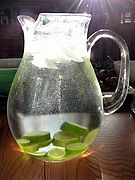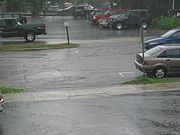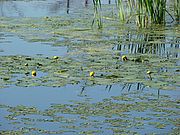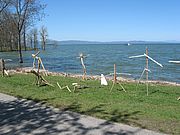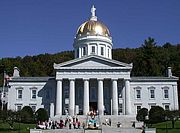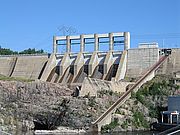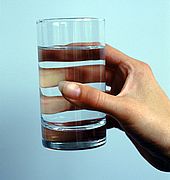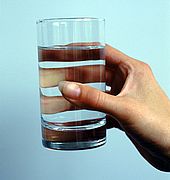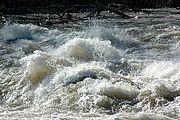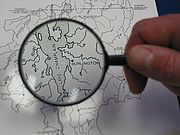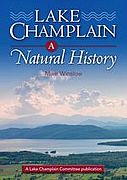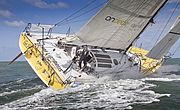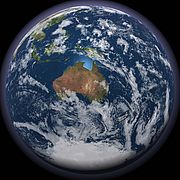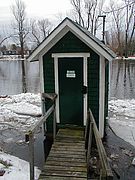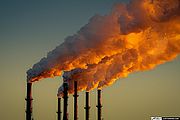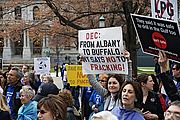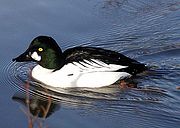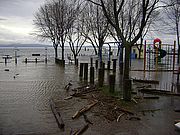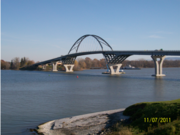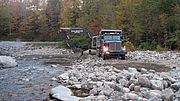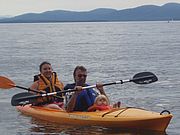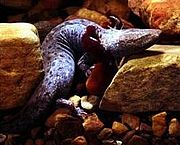As the weather warms we are more likely to turn to a nice cold drink of water to quench our thirst on a hot afternoon. Fill a pitcher and keep it in the refrigerator rather than running the tap until the water cools every time you need a drink. Doing so saves energy, saves water, and helps protect Lake Champlain. MORE Read...
News from Selected Category
Pollution loading from developed lands remains one of the most difficult sources of phosphorus to control. The Lake Champlain Basin Program (LCBP) recently released two requests for proposals for studies that could improve management of developed lands in the New York portion of the watershed. One project would outline a program to better manage New York back roads. MORE Read...
The Lake Champlain Committee has been working with the Vermont Agency of Natural Resources to help map aquatic natural resources in Vermont. The work is part of a larger project to produce a statewide map and supporting database identifying the lands and waters that support high priority ecosystems, natural communities, and habitats worthy of conservation or restoration. MORE Read...
Spring is a great time for finding driftwood on the shores of Lake Champlain. The wood can come from trees along forested shorelines that were undermined by wind and wave erosion, but more commonly it is delivered by streams and rivers entering the lake. Once in the lake, driftwood can remain afloat for long periods of time. In Oregon’s Crater Lake one piece of 9 meter long driftwood known as ‘the Old Man of the Lake’ has been floating around since at least 1896. MORE Read...
Earlier this month we reported that in February, the Vermont House passed a three-year moratorium on the gas extraction procedure known as fracking. Now that the cross-over deadline has passed, Senate and House Committees will be spending more time on bills that were passed by the opposite side. The fracking bill is currently in the Senate Natural Resources Committee and testimony will begin on Thursday, March 22. LCC supports a fracking moratorium in the Champlain watershed. MORE Read...
The proposal to install a 1,000-megawatt transmission line on the bottom of Lake Champlain to transport hydro and wind power from Canada to the New York City market continues to move forward. At the end of February the project proponent, Transmission Developers Inc. (TDI), said it had reached agreements with numerous state agencies, local governments and environmental groups on many aspects of the project. MORE Read...
The winter of 2011-12 will go down as the second warmest on record (behind only 2001-02) in the Champlain Valley. Meteorological winter includes the months of December, January, and February. Meteorologists report that low air pressure associated with the North Atlantic portion of the Arctic Oscillation kept the jet stream from pushing south and bottled up the Arctic air masses, letting warm southern air flood our region. MORE Read...
Dan Jacobs has donated over 25 hours of his time with the Lake Champlain Committee (LCC) since August 2011, assisting with organization mailings and member communication pieces. Jacobs, a Burlington, Vermont resident, began volunteering to help Lake Champlain, as well as expand his area network. “Summer is when I appreciate the lake the most, sailing near Converse Bay, swimming at Juniper Island and biking along the Causeway,” says Jacobs. MORE Read...
On a recent winter day my family was exploring some woodlands along the shore of a river near Lake Champlain. My daughter exclaimed about the huge birds in the trees on the opposite side. Three bald eagles sat regally staring out over the landscape. Bald eagles were once nearly unheard of in the skies of our region. Now, they are following in the path of osprey populations as their numbers steadily increase. MORE Read...
The Plattsburgh Press Republican recently reported that the spillway at the 90-year old Mead Dam, which supplies water for the city, does not meet state regulations and must be reconstructed. Like many places throughout the country, Plattsburgh faces an aging water supply system. The American Society of Civil Engineers recently gave our nation’s drinking water infrastructure a grade of D-. MORE Read...
Lake Champlain Committee Staff Scientist Mike Winslow was featured on WCAX's evening news to discuss our aging national and local water infrastructure systems. Watch the interview on our website. MORE Read...
The past year will forever be remembered as the year of flooding. Record high lake levels in the spring were followed by Tropical Storm Irene in the late-summer. With such tremendous increases in the amount of water in the lake and in our rivers, how did aquatic organisms survive the disasters? MORE Read...
Watershed for Every Classroom is a year-long, 11-day professional development experience for K-12 teachers. In a supportive, collaborative, and fun environment, we explore the many different ecological and cultural stories of the Lake Champlain Basin. Teachers test for water quality, visit farms, paddle waterways, look out over mountaintops, tour urban areas, and much more as they learn ways to engage students in the many issues that face our watershed. MORE Read...
Look in LCC’s Award-winning book! Why is ice so hard and slippery? Does Lake Champlain produce lake-affect snow? Why does fog form over the lake on cold days? What is the probability that Lake Champlain will freeze over in any year? MORE Read...
On Thursday March 15, Brad Van Liew, the only American to win a solo around the world sailboat race will speak at the Main Street Landing Film House, 60 Lake Street in Burlington, Vermont. The event is the Spring Ice Breaker of The Regatta for Lake Champlain, one of the Lake Champlain Committee’s fundraising partners. More people have traveled in space than have sailed around the globe alone. Brad Van Liew is one of only 15 Americans to do so. MORE Read...
Educators and interested citizens can learn more about the science behind climate change and action steps for students in a hands-on workshop. The workshop will run from 8:30 AM until 3:00 PM on Saturday, March 10 at St. Michael’s College, Colchester, Vermont. MORE Read...
Thanks to the work of Senators Leahy and Schumer, funding for USGS stream gages has been extended -- for the time being. Eighteen gages in the Champlain Valley – nine in Vermont and nine in New York - were slated for closure. MORE Read...
The end of the year brought good and bad news on management of air pollution in the United States. On the plus side, EPA Administrator Lisa Jackson announced new rules and standards that will cut mercury emissions from power plants by up to 90%. MORE Read...
The issue of using hydraulic fracturing or “fracking” as a means of extracting natural gas from shale and other tightly packed rock formations has stirred a great deal of controversy. MORE Read...
Winter is a great time for observing waterfowl on Lake Champlain. During the chilly months many birds escape from even colder northern climes to the relative warmth and tranquility of Lake Champlain. Ducks can be found wherever the edge of the ice is. MORE Read...
Membership support provides the majority of LCC’s funding and helps us protect water quality, safeguard natural habitats and enhance recreational access. MORE Read...
The historic flooding of 2011 sent unprecedented quantities of nutrients, sediments and debris into the lake and brought tragic losses to many communities. The events reinforced the need to adapt to climate change by ensuring that our infrastructure can handle the inevitability of more frequent and intense storms. Many thanks to LCC members who made a special donation (separate from annual membership) to LCC’s flood recovery work. MORE Read...
LCC is seeking the following items and help for our new office space and work on the water. If you have items or time to contribute, please contact LCC Executive Director Lori Fisher. MORE Read...
LCC’s work for a healthy, accessible lake depends upon the active involvement of many dedicated volunteers who lend heads, hands, and heart in a myriad of ways. As we close out 2011the LCC Board of Directors and staff extend our thanks to everyone who has supported our efforts in the field, on the water and out in the community. MORE Read...
The Lake Champlain Committee staff got a boost this fall with the hiring of Office Manager Jessica Rossi. A graduate of Elon University with a degree in strategic communications and business administration, she previously worked for the Boy Scouts of America, The Nature Conservancy in North Carolina and the Community Foundation of the Eastern Shore. MORE Read...
On November 7th the new bridge over Lake Champlain at Crown Point opened to the public. It replaced a structure built in 1929 under the administration of Franklin Delano Roosevelt, who was governor of New York at the time. That bridge was closed abruptly two years ago due to safety issues and destroyed in a controlled explosion in December 2009. MORE Read...
On November 15th at the Vermont statehouse, lawmakers discussed issues surrounding gravel extraction as a response to Tropical Storm Irene. They heard from academics and state regulators about how removing gravel can often exacerbate downstream flooding by increasing water flow and power. MORE Read...
The twice annual mixing of the lake’s warm and cold layers begins in earnest once the water temperature dips below 40F. At that point, the lake water temperature and thus density becomes relatively uniform from top to bottom. When the lake reaches the uniform top to bottom temperature, wind and storms cause the water to turnover. This mixing helps oxygenate the deeper water and re-circulate nutrients up to the shallower waters. MORE Read...
Gary loved Lake Champlain. Binoculars at the ready, always a close eye on the level of the lake, concern for how the Winooski was affecting water clarity in a given summer, whether the storm rumbling above the Adirondacks would make it to Colchester Point. MORE Read...
The native mudpuppy, a large salamander that lives in rivers along Lake Champlain, was denied a spot on Vermont's Endangered Species List for the second time since 2002. The Endangered Species Committee and Natural Resource Secretary Deb Markowitz are in disagreement on whether sufficient data exists to warrant protection for the salamander. MORE Read...

